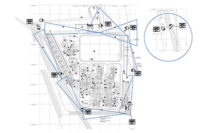
As security systems have become more complete, and with systems that integrate video surveillance, access control and intrusion protection on the rise, the need for skilled technicians and project managers is greater than ever. Proper training is essential to ensuring that employees have the right skills — and fortunately, the industry offers a wide range of training and certification programs that are tailored to meet the needs of today’s increasingly sophisticated security market. Additionally, some security companies have developed their own in-house training programs, which sometimes are supplemented by training provided by key vendors and industry associations.

WHAT THE INTEGRATORS SAY
From the employee’s point of view, many security companies are willing to take responsibility for a large part of training requirements, rather than expecting the employee to obtain that training on his or her own prior to being hired. One such company is MCM Integrated Systems, a Van Nuys, Calif.-based security integrator that specializes in access control and CCTV. As MCM systems engineer Rick Vergara explains, when the company hires new technicians, “We’re not necessarily looking for them to have certain certifications or training. We want to make sure they have a good technical background and we take it from there.†In keeping with this home-grown approach, MCM typically hires project managers from within, offering a promotion path for promising technicians.MCM does most of its training in-house — and as more and more security systems rely on data networks for connectivity, information technology has become part of that training. “Technicians need to understand operating systems and networking and how to program servers and routers,†Vergara says. Although MCM takes responsibility for IT training, Vergara notes that, “We’re looking for people who are more versed in the IT world. When we hire people, we look at their computer skills today, [whereas] we didn’t before.â€
To supplement its in-house training, MCM also sends technicians and project managers to training provided by key vendors. Sometimes that training is at the manufacturer’s headquarters, although some manufacturers offer training at various locations nationwide throughout the year. Some manufacturers charge for training of their products, while others offer it at no charge, although they may require companies to purchase a certain volume of products before they are eligible. Installing companies virtually always pay their own travel expenses.
Another security integrator that does a large part of its training in house is Safeguard of Scottsdale, Ariz. Employees, who are paid for their time, are required to attend mandatory training classes on certain Saturdays. The company has a trainer on staff, and project managers and senior technicians also do some of the training, explains Ben Wilson, Safeguard vice president of operations. To encourage employees to learn even more, the company also gives employees pay raises when they achieve certain industry certifications.
Recently, several Safeguard employees passed a test offered by the National Systems Contractors Association (NSCA) to become certified system installers (C-SI). Other certifications that can earn Safeguard employees a pay raise include individual certifications in fire, audio and video surveillance offered by the National Institute for Certification in Engineering Technologies (NICET), a not-for-profit organization created by the National Society of Professional Engineers.
Project managers at Safeguard go through much of the same training as the technicians. In addition, they generally attend a multi-day class that prepares them for a test to get a certificate in project management from the NSCA.
NETWORKING
With the increased incidence of networked security systems, many companies today like to have at least one person on staff who has a networking certification from an IT organization such as Microsoft or Cisco. MCM and Safeguard each have one Microsoft-certified employee.The training and study required to achieve such certification is quite rigorous, however. As Wilson points out, people with such certifications are “few and far between, and unless you’re doing it day in and day out, you’re not going to pass the test.â€
Only a few clients ask about networking certifications today, Vergara notes. But he adds that he expects that to change and that eventually MCM will need to add more employees who have received such certification.
Another group that has witnessed a growing need for networking certification is the PSA Security Network, an organization of security integrators. PSA recently finalized guidelines for a national account program aimed at enabling members to team together to serve large corporations with multiple locations. Dave Homet, business development officer for PSA, says the program “gives members the ability to hand off national account work from one member to another and know that they will have continuity.â€
Participation in the program is voluntary, but any PSA member wishing to participate must meet a series of qualifications and requirements. Among others, these include having at least one project manager certified by the Security Industry Association or the Project Management Institute and having at least one project manager who has been trained by Cisco or Microsoft who is a certified information systems security professional (CISSP). The certifying body for CISSP is the International Information Systems Security Certification Consortium, and training to prepare project managers for certification testing is available from a number of organizations.
Links to Resources
National Burglar & Fire Alarm Associationwww.alarm.org
Security Industry Association
www.siaonline.org
National Systems Contractors Association
www.nsca.org
PSA Security Network
www.psasecurity.com

Training and Certifying Organizations
Training and certification programs for security technicians and project managers are offered by a wide range of organizations, and in some cases, security integrators have more than one alternative. Here’s a roundup of some of the most popular programs.Technician Training
The National Burglar and Fire Alarm Association (NBFAA) has offered certification for security technicians for many years and continues to see strong demand for its fire and Level 1 and 2 security technician certification, notes NBFAA director of education and standards Dale Eller. He adds that NBFAA Level 1 certification is a requirement for licensed technicians in some states.
Even where it’s not a legal requirement, there are other benefits, too, Eller says. “From a company’s standpoint, there’s a marketing advantage when you can go in front of a consumer and say, ‘Our technicians are certified and here’s what that means.’†To prepare for the certification test, technicians can attend NBFAA classes or, alternatively, some classes are available online. To date, the NBFAA has met the need for training on video surveillance, networking and access control primarily through continuing education courses, which technicians are required to take to retain their certification. But the NBFAA is working toward creating a Level 3 security technician certification, which will focus more heavily on those technologies, Eller says.
The National Systems Contractors Association (NSCA) offers an alternative certification program for installers and technicians. The NSCA, which previously focused on audio, now covers fiber, access control and CCTV installation as part of its certification testing. The comprehensive nature of that training appealed to Safeguard, a Scottsdale, Ariz.-based integrator that handles a wide range of installations. Safeguard also liked the fact that the NSCA test had a hands-on performance-verification component, notes Ben Wilson, Safeguard vice president of operations. Although NSCA offers review courses to help candidates prepare for testing, Safeguard readied employees in-house by providing their own facilitators and encouraging study sessions.
A third option for technician training comes from the International Brotherhood of Electrical Workers, which offers a joint apprentice training program that focuses on security. One security integrator that relies heavily on that program is CHS of Farmingale, N.Y. Classes are offered near the company headquarters, and technicians also learn skills on the job. “People usually go two nights a week for five to six years,†notes CHS president Jeff Goldat. CHS and other participants pay 40 cents per employee per hour worked to cover the costs of the classes. Participation in the IBEW program makes CHS a union shop, and that also helps in winning jobs for certain customers, Goldat adds.
Project Managers
At least three organizations offer project management certification. The NSCA and Project Management Institute offer programs that are appropriate for project managers in a range of industries, while the Security Industry Association’s program is specific to the security business. Holly Wells, SIA manager of educational programs and services, notes that by attaining SIA certification, people demonstrate their capability of managing and holding together security projects. “A lot of people come to us who have been in the industry for 20 years and are looking for recognition for their level of capability,†Wells says.
SIA’s project management certification program, which was started about two years ago, requires people to have between 2,500 and 4,000 hours of experience, depending on level of education. The program includes a self-study component and a one-week classroom component, with an exam after the completion of each component. Another element is a portfolio assessment two years after completion of the initial program. The assessment process “is a survey to see that project managers have implemented the skills and knowledge that they have learned during the initial credentialing,†Wells explains. The process includes a written component and a one-on-one discussion with a SIA trainer in which the trainer reviews jobs that the project manager has handled over the last two years. After successful completion of the portfolio assessment, project managers are certified for five years, at which point they will need to be re-certified.
Other Training
Virtually all certification programs require people who have been certified to continue to expand their knowledge base through continuing education units. Some manufacturer-provided training is eligible for CEUs from various certification bodies. Additionally, organizations such as the NBFAA and the PSA Security Network offer CEU-approved courses.
Links
- Security Industry Association
- Security Industry Association
- Security Industry Association
- Security Industry Association
- PSA Security Network
- PSA Security Network
- PSA Security Network
- PSA Security Network
- National Burglar & Fire Alarm Association (NBFAA)
- National Burglar & Fire Alarm Association (NBFAA)
- National Burglar & Fire Alarm Association (NBFAA)
- National Burglar & Fire Alarm Association (NBFAA)
- National Systems Contractors Association
- National Systems Contractors Association
- National Systems Contractors Association
- National Systems Contractors Association

